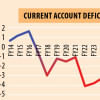Forex position to stabilise in next few months: Moody's

US ratings agency Moody's has projected that Bangladesh's foreign exchange reserves position will stabilise over the next few months despite repeatedly failing to fulfil the IMF's target and the drastic fall in international currency holdings over the past two years.
It will be supported by the recent improvement of the current account balance to modest surpluses partly reflecting ongoing import restrictions, narrowing financial account deficits as business uncertainties gradually ease following the conclusion of the general elections in January, it said.
The continued disbursements of concessional financing by international financial institutions will also contribute to the improvement, the ratings agency said in a report.
The latter also reflects progress on benchmarks and targets specified by the current $4.7 billion loan programme of the International Monetary Fund (IMF).
Before June 2022, the country's reserves were more than $40 billion. But since then, it has been gradually declining owing to higher outflows driven by an elevated level of commodity prices against lower inflows in the form of remittance and export receipts.
On May 21 this year, the reserves stood at $18.61 billion, central bank data showed.
The report comes as Moody's completed a periodic review of the ratings of Bangladesh. It said the ratings, including its B1 long-term issuer rating, with a stable outlook remains unchanged.
"The stable outlook reflects Bangladesh's continued access to concessionary financing and support from international financial institutions."
Moody's expects external financing to help alleviate pressures on the external and fiscal metrics, enabling a stabilisation of external buffers although at a weaker level than before the pandemic.
It said the stable outlook is also underpinned by Bangladesh's economic resilience, supported by its globally competitive readymade garment industry, the second-largest in the world.
At the same time, the resilience is balanced against the country's low per capita income, constraints in infrastructure and human capital, low economic competitiveness, and high concentration among drivers of economic growth, particularly regarding the garment sector.
Moody's also said that Bangladesh's credit profile balances the country's robust growth prospects and moderate debt burden against its narrow revenue base that restricts fiscal flexibility and institutional weaknesses that constrain competitiveness.
While the competitive readymade garments industry will continue to contribute to GDP, exports, and incomes over the long term, weaker global demand, together with financial account deficits, have weakened Bangladesh's external position and increased liquidity pressures over the more immediate rating horizon, according to the report.
Debt affordability remains weak due to higher interest expenses relative to Bangladesh's low revenue generation capacity and the relatively modest, but rising, general government debt burden.
"The external position will remain at a weaker level versus two to three years ago," Moody's said.
It said inflationary pressures will remain high, curbing household consumption and keeping economic growth at a relatively modest level.
The Consumer Price Index grew 9.74 percent in April. It averaged 9.02 percent in the last fiscal year, the highest in more than a decade.


 For all latest news, follow The Daily Star's Google News channel.
For all latest news, follow The Daily Star's Google News channel. 








Comments